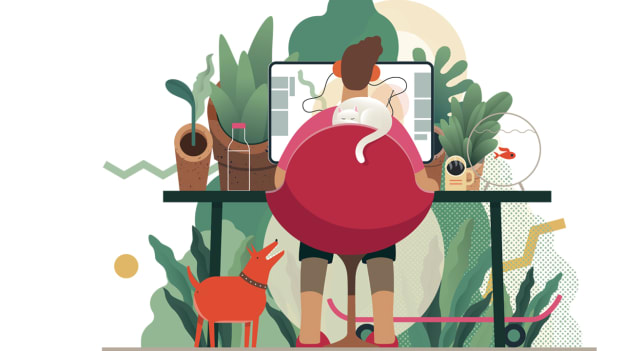'Switching-off' when working from home

When one is in the workplace, it is much easier to understand when to stop for the day. It's either because one would want to beat the traffic to home, get back to their family, reach a dinner meeting with friends in time, or fundamentally have a perfect work-life balance. Although this doesn’t guarantee efficiency all the time, it surely does make employees effective; which means they can do the right things ~80% of the time.
Now, what about when one is working from home, especially during a lockdown? With all the uninvited distractions at home, the absence of commuting to and from work, not having to rush with the meals, and several other factors, employees would have more of both diversion and time to catch up.
With so much of time in hand (seems like all the time in the world) it is only human to involuntarily wanting to fill the available time with the quantum of work that one has. According to Parkinson's Law – which is built on the 'self-interest' principle – some would maximize the time it takes to accomplish a task or a series of tasks in order to fill a paid workday. An approach like this towards work makes it difficult for some people to understand when to switch off from work because nothing seems more pressing than the task in hand.
Once I started doing my own research on how to get used to this new business arrangement, I stumbled upon this interesting Zeigarnik Effect. This suggests that the mere completion of a task can lead to it being forgotten, whilst incomplete tasks help to ensure the employee remembered the tasks. The Lithuanian psychologist, Zeigarnik, asserted that interruption during a task that requires focus can improve a person’s ability to remember it afterward.
While the gig workers, millennials and Gen Z would be thriving in this work arrangement, many traditional workers, who have had a set routine for several decades will need to get used to this new normal until things resume to being business as usual.
In this scenario, I believe that there are a few things that employees can do to maintain a good work-life balance when working from home –
- Designated workspace at home: We all know that creating a designated workspace at home enhances productivity. In addition, building an office-like atmosphere will help one keep a track of designated working hours because it would seem like working from office, cut-off from family and friends for most part of the day. While this necessarily doesn’t mean bringing the office to home, it can surely help focus on work during work hours and take care of personal life afterward.
- Retain Routine: Just because one doesn't have to worry about commuting to and from office doesn't mean one can break their routine. If you always had a daily schedule of waking up early, working out, doing household things, getting ready for work, cooking food, sleeping early etc., do not break it.
- Habit Formation: Despite staying committed to a routine, there will still be some free time left for a few. These 30 to 60 minutes of free time can cause more confusion that anything else because you'd usually spend this time commuting or ironing your clothes for the day or something similar.
Instead of trying to drag your work into these hours, you can read a book, pick up a hobby, take online interactive courses and do a lot more. These are just some examples; I'm sure everyone has a habit of interest or subjects one would want to expertise in. Therefore, leveraging the available time is the way to stay engaged and hone your skills.
Additionally, you can also follow the below tips to promptly switch on for work and off from work
- In reference to the Zeigarnik Effect, start those tasks that you can complete efficiently to avoid thinking a lot about those that you haven't completed.
- Prepare a to-do list before you start working to ensure your thoughts are organized. This can also help you in spotting potential issues and think of a solution proactively.
- Shut down your work phone and laptop after work.
- Leave the designated workplace after you have completed all tasks in your to-do list and gradually switch to a relaxing work, such as changing clothes, taking a shower or cooking a nice meal. This would mean your brain is getting ready to switch off from work.
Work-life balance is important, more so in today's world of work where many of us catch ourselves thinking about work despite leaving office. While some work overtime to make ends meet, some love what they do truly and clock out late out of free will.
Despite being subjective, several experts opine that a good work-life balance means not carrying the work baggage back home. But when you're working from home, building these practices and switching off from work can help you save yourself from damaging your health and overall well-being.
















